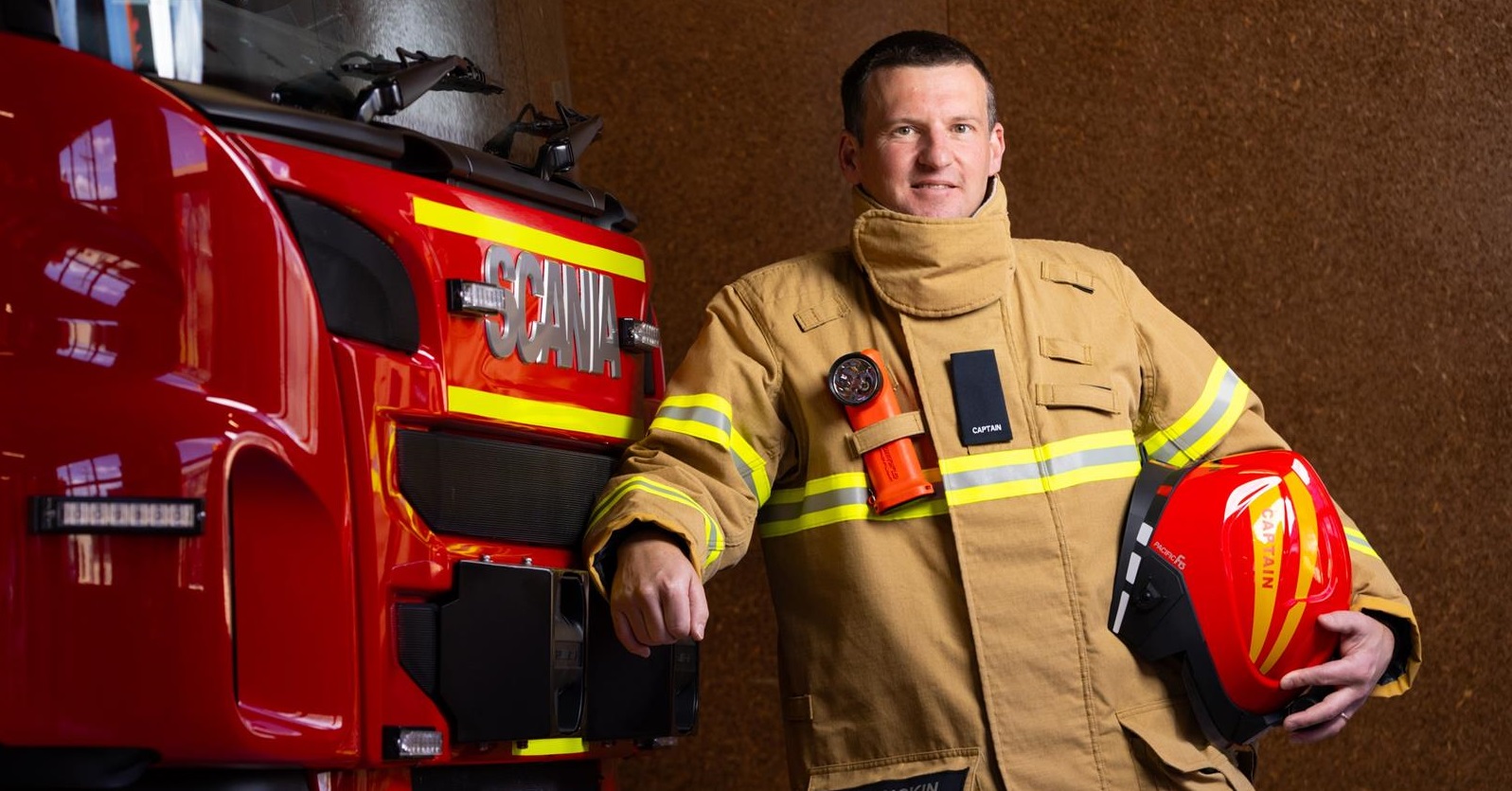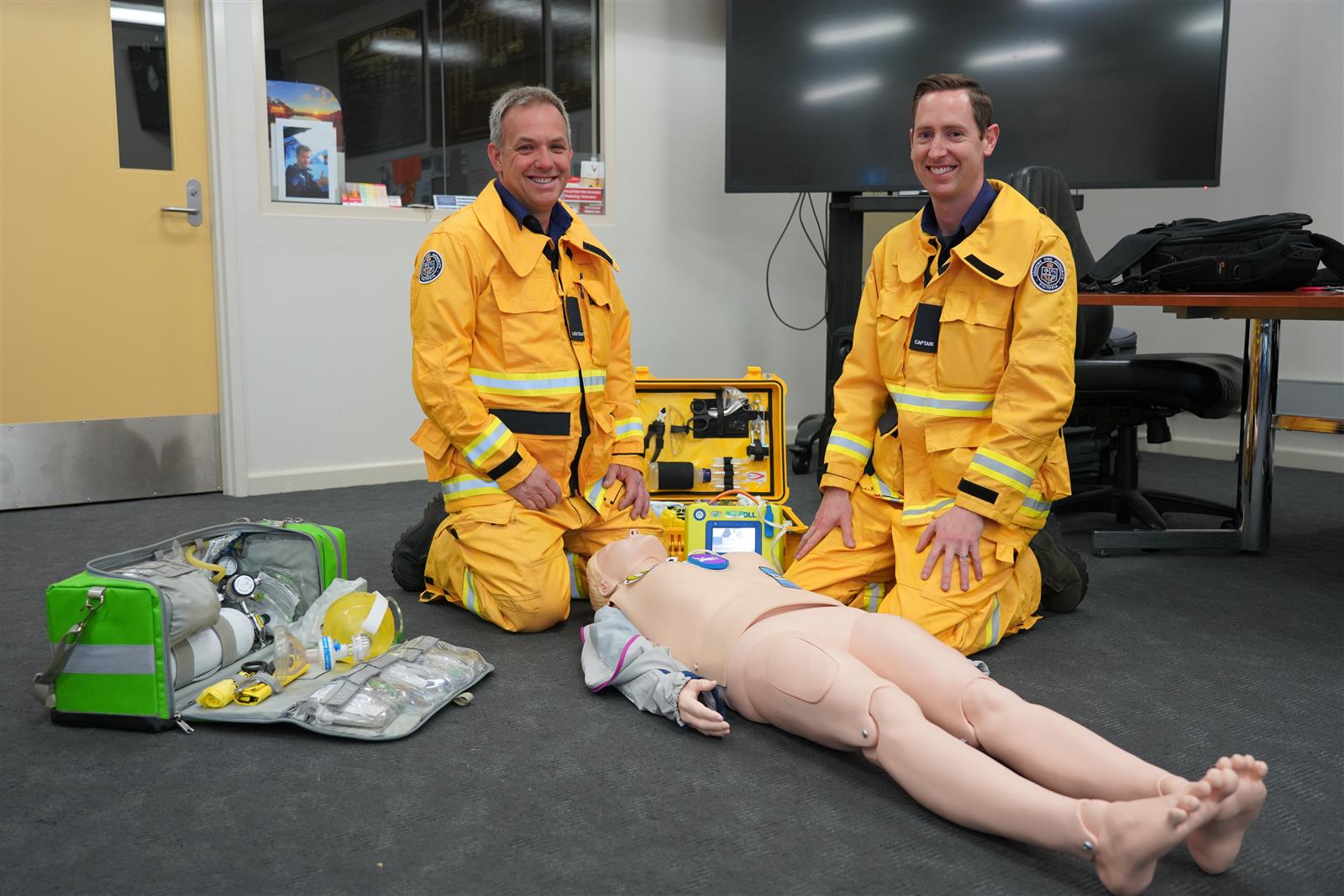
Emergency Medical Response (EMR) aims to improve survival rates by reducing response times.
EMR started in CFA with a pilot program in 2007 and was expanded to include all integrated brigades (which had career firefighters as well as volunteers). Today there are six remaining volunteer-only EMR brigades that have 81 qualified responders between them. These are Berwick, Cranbourne, Edithvale, Mornington, South Morang and Whittlesea.
Trained CFA EMR volunteers respond to ‘Priority 0’ medical emergencies at the same time as Ambulance Victoria (AV) paramedics to improve the chances of patient survival. As a part of their role, these volunteers can expect to attend a range of medical emergencies including cardiac or respiratory arrest, stroke, drowning, anaphylaxis, asthma, choking and drug overdose.
Volunteers at a CFA EMR brigade who want to become EMR responders must complete a nationally-recognised Certificate II in Medical Service First Response. This training is complemented by six clinical education sessions each year, annual CPR reaccreditation and a three-yearly reaccreditation of skills.
We applaud the work CFA’s EMR volunteers have done and continue to do for the communities they serve. The true ‘beating heart’ of the EMR program comes from the passion and dedication of the responders themselves.
We spoke to members from two of our EMR brigades about their experiences.
SEAN MCGUCKIN, EDITHVALE BRIGADE
Sean McGuckin, captain and EMR responder at Edithvale Fire Brigade (pictured above) joined the brigade in 2021 after being a CFA volunteer at other brigades for more than 20 years. He decided to train as an EMR responder because he thought it would be good to help the community in more ways than just firefighting. Living near the brigade and having good daytime availability to respond was a bonus.
“I do EMR because I know I can make a difference,”: Sean said. “I have pride in knowing we are here for all emergencies. I walk around my community and they know I’m one of the people who is here for them.”
Sean completed the initial EMR training in 2022 and has since attended about 15 to 20 EMR cases. Edithvale brigade, with 26 qualified EMR members, attends about 50 EMR cases each year.
“We do a lot of training but there needs to be,” Sean said. “We’re not providing basic first-aid. EMR is in a different league to that. Responders need to be prepared for that and willing to meet both the community’s and CFA’s expectations.”
Some of the incidents Sean has attended have had successful outcomes. Sadly, many of the others have been unsuccessful, although Sean said that was not because of a lack of effort by the EMR responders.
“People in a life-critical situation such as those we respond to will more than likely die without assistance. As first responders we offer a chance to halt that process but sometimes death is inevitable with or without intervention,” Sean said.
According to Sean his most interesting case was a call to assist a man found face down in the ocean. When he arrived on scene, he found a member of the public performing CPR on an unconscious, non-responsive man in a boat. It was a dynamic situation and many factors influenced how it was managed.
“The complexities of this case included the instability of the boat for effective CPR, all types of fishing gear strewn around the boat, the difficulty of patient extrication and multiple distraught bystanders,” Sean said.
Sean also recalled a local footy game that he and another EMR responder were attending as community members.
“A player went up for a big mark, received a knock to the head and came down hard. Trainers looked at us knowing we could help – and we did. We called our brigade to get EMR response and we assisted until AV arrived. In our local community we ‘fly the flag’ and our community recognises that.”
Sean recognises the exceptional collaboration with AV.
“We see each case through to the end, assisting paramedics in any way including extrication and being gofers. We know the ambulance layout and can find equipment easily. We also provide solid handovers to paramedics to provide optimum patient care.
“I would always recommend EMR to volunteers, but they need to be mature and level-headed to do it. We’re trained to deal with a body on the floor, but the grieving bystanders are often the hardest part of a callout. There is also a real likelihood of knowing the patient or having a connection to them in some way.
“Deaths can be disheartening but it only takes one successful save to reinforce that being an EMR responder is 100 per cent worthwhile.”
RICHARD GARDINER AND DARREN SMITH, WHITTLESEA BRIGADE
Whittlesea Fire Brigade Captain Richard Gardiner and EMR Coordinator Darren Smith have both been active CFA EMR responders since 2008. Whittlesea was the first volunteer brigade to get an EMR call – only two hours after going online – and Darren attended it.
Richard and Darren were already CFA volunteers at Whittlesea when EMR was introduced. They saw EMR as an evolution of the brigade and a logical use of skills to be able to further assist their community – just like they do with fires, car accidents and other emergency calls.
Whittlesea attends about 15 to 20 EMR calls a year, and Darren and Richard attend most of them.
Given the often complex situations, it’s not easy to define what a successful EMR case is. But Richard and Darren aim to assist with resuscitation to the point where they are able to achieve ‘return of spontaneous circulation’ (ROSC), allowing the patient to be transported to hospital by AV. The brigade has achieved this about a dozen times over the years. Both Richard and Darren recall one person who is still walking around town today thanks to their emergency intervention and care.
“Taking over emergency care and absolving the family or bystanders of this responsibility is very worthwhile,” Richard said.
Darren agreed adding, “sometimes our actions might not save the patient, but transport to hospital with ROSC might allow the patient’s loved ones the time and opportunity to say goodbye”.
Darren recalls his first EMR case, which had an emotional impact on him.
“I suppose I never expected to be called out to a young child with an earache and a viral infection, which ultimately caused their death,” Darren said. “That job was tough and made me wonder whether I wanted to continue with EMR.”
He also recalled a case that needed more planning and thinking than emergency care.
“The patient was a hoarder and was in a house completely hidden by trees and undergrowth. When we arrived, we noticed all the doors to the house had about a two-metre drop to the ground, and inside there was a very narrow corridor. We had a choice of making a path outside using rake hoes and axes or trying to clear a path along the narrow corridor, which is the option we chose. Luckily, the patient wasn’t too sick and we eventually extricated him to the ambulance. It was a challenging case, just not clinically.”
One challenge for the brigade is maintaining EMR members for 24/7 availability.
“A low utilisation of the EMR skill set can cause responders to lose confidence,” Richard said. “Also, there can be a perception that EMR training is sterile and different to EMR in real life. Members may be concerned about all the potential EMR scenarios they may face. Ultimately, these scenes are not that dissimilar to much of the other work we already do.
“Another challenge that can cause people to reconsider their EMR role is dealing with a grieving family and bystanders. It can be hard.”
“The training needs solid commitment. It requires time and you must want to do it, but I’ve never heard anybody say the training was a waste of time,” Darren said.
“EMR is about having the knowledge and skill set and applying it to the best of your ability to help people. We can’t prepare for everything but we can try to make a situation better than how we found it.”
“EMR saves lives,” Richard said. “That’s why I do it. I’d like someone to help me if I needed it, so I owe it to others to help them.”
 RICHARD GARDINER AND DARREN SMITH, WHITTLESEA FIRE BRIGADE
RICHARD GARDINER AND DARREN SMITH, WHITTLESEA FIRE BRIGADE-
-
-
-
| Submitted by |
Carolyn Cole-Sinclair |